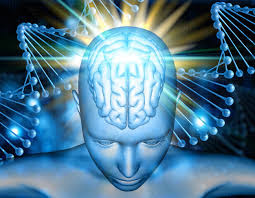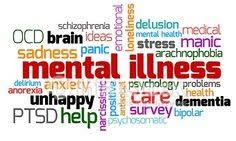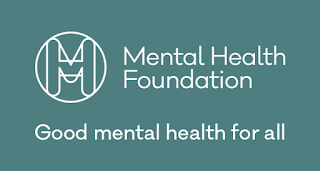Mental health is a level of psychological well-being or mental illness - the state of somebody who is performing at a satisfactory level of emotional and behavioral adjustment". From the views of positive psychology or of holistic theory, the mental state may include a person's ability to get pleasure from life, and to make a balance between life activities and efforts to attain psychological resilience.
I think it’s important that we place the mental state in the spotlight as a result of psychological state conditions are thus common. Research shows the United States that mental health is the greatest illness burden in the world for young adults and teenagers.
What will it mean to be aware of mental health? It means taking care of yourself. It means that being conscious of your triggers and noticing if one thing makes you anxious or depressed. Once you feel those feelings, own them. Don’t run far from one thing that’s inflicting you distress. That may sound scary, however, it’s really better than avoiding your pain. After you confront your feelings head-on, you’re ready to better perceive what you’re browsing, process those feelings, and go on.
Being aware of and sensitive to the psychological state is very important for several reasons. There has been a good deal of progress with reference to understanding the importance of taking care of one’s psychological state. Though some people look for professional guidance, others are also skeptical of how a counselor or expert will facilitate them. If you’re considering finding a therapist for yourself, you'll be able to build a modification in your life for the better.
According to the National Alliance on mental illness (NAMI), one in five Americans has a mental disease, suggesting that psychological state is extraordinarily common. One in five persons living with the psychological state means if you’re sitting at a table for lunch with 5 of your friends, one in all you probably have anxiety, depression, bipolar, posttraumatic stress disorder (PTSD), or another mental state.
People are rather more willing to speak regarding mental disease than previously. It’s not shameful to possess a mental health issue and is often liberating for people to express what they’re browsing. In doing this, they'll realize people to relate to and feel less alone.
Mental illness is real. Though it’s exhausting to do, realize somebody you are feeling comfortable with and mention your feelings. There are mental health professionals who are trained to assist you with these issues. Don’t quit on finding help. You're not alone! A mental health professional is also the one to change your life. They care regarding you and may guide you through your struggles and show you that there's a much better quality of life out there.
Here are some mental and emotional health factors and assessments
• Amount of interest or pleasure in doing everything
• Feeling down, depressed or hopeless
• Quality of sleep
• Amount of energy
• Quality of appetite (no appetency, overeating, etc.)
• Feeling bad regarding yourself, that you simply are a failure or have let somebody down
• Trouble concentrating
• Being fidgety or restless
• Moving or speaking so slowly others noticed
• Ability to manage worries
• Ability to relax
• Whether you become simply irritable
• Being in a constant state of worry
There are many alternative conditions that are recognized as mental diseases. The more common types include
Anxiety disorder
People with anxiety disorders answer certain objects or things with worry and dread, further like physical signs of tension or panic. Anxiety disorders include panic disorder, social anxiety disorder, and specific phobias
Mood disorders
These disorders also called as affectional disorders involve persistent feelings of unhappiness or periods of feeling excessively happy or fluctuations from extreme happiness to extreme unhappiness. The most common mood disorders are depression, emotional disorder, and cyclothymic disorder.
Psychotic disorders
Psychotic disorders involve distorted awareness and thinking. 2 of the most common symptoms of psychotic disorders are hallucinations -- the experience of pictures or sounds that don't seem to be real, like hearing voices -- and delusions, that are false fixed beliefs that the sick person accepts as true, despite proof to the contrary. Psychosis is associate degree example of a psychotic disorder.
Eating disorders
Eating disorders involve extreme emotions, attitudes, involving weight and food.
Anorexia, Bulimia nervosa, and Binge disorder are common eating disorders.
Impulse control and addiction disorders
People with impulse control disorders are unable to resist urges, or impulses, to perform acts that might be harmful to themselves or others. Pyromania (starting fires), kleptomania (stealing), and compulsive gambling are samples of impulse control disorders. Alcohol and drug are common objects of addictions.
Personality Disorders
People with temperament disorders have extreme and inflexible temperament traits that are distressing to the person or cause issues in work, school, or social relationships. Additionally, the person's way of thinking and behavior considerably disagree with the expectations of society and are so rigid that they interfere with the person's traditional functioning. Examples of this psychological disorder are personality disorder and paranoid personality disorder.
Obsessive-compulsive disorder (OCD)
People with OCD are affected by constant thoughts or fears that cause them to perform certain rituals or routines. The distressful thoughts are referred to as obsessions, associate degree example may be a person with an unreasonable fear of germs who again and again wash his or her hands.
Post-traumatic stress disorder (PTSD)
Anxiety disorder is a condition that may develop following a traumatic and alarming event, like a sexual or physical assault, the sudden death of a dearest, or a natural disaster. People with anxiety disorder usually have lasting and horrifying thoughts and recollections of the event and have a tendency to be showing emotion numb.
Stress response syndromes
Stress response syndromes occur when an individual develops emotional or behavioral symptoms in response to a stressful event or situation. The stressors may include natural disasters, like an earthquake or tornado; events or crises, like a car accident or the diagnosing of a significant illness; or interpersonal issues, like a divorce, death of a dearest, loss of employment, or a problem with substance abuse. Stress response syndromes sometimes begin inside three months of the event or situation and end inside six months once the stressor stops or is eliminated.
Dissociative disorders
People with these disorders suffer severe disturbances or changes in memory, consciousness, identity, and general awareness of themselves and their surroundings. These disorders sometimes are related to overwhelming stress, which can be the results of traumatic events, accidents, or disasters that may be practiced or witnessed by the individual. Split personality and depersonalization disorder are samples of dissociative disorders.
Sexual and gender disorders
These disorders have an effect on sexual desire, performance, and behavior. Sexual dysfunction, gender identity disorder are samples of sexual and gender disorders.
Somatic symptom disorders
An individual with a somatic symptom disorder, mentioned as a psychological disorder or somatoform disorder, experiences physical symptoms of an illness or of pain with an excessive and disproportionate level of distress, despite whether or not a doctor can notice a medical cause for the symptoms.
Tic disorders:
People with tic disorders create sounds or show non-purposeful body movements that are recurrent, quick and sudden.
Other diseases or conditions, together with varied sleep-related issues and lots of kinds of dementia, together with Alzheimer's disease generally classified as mental diseases, because they involve the brain.
Rare Mental Disorders
Stendhal Syndrome
Those with Stendhal syndrome, have physical and emotional anxiety. They have panic attacks, dissociative experiences, confusion, and hallucinations when exposed to art. These symptoms are sometimes triggered by “art that's perceived as significantly beautiful or when the individual is exposed to large quantities of art that are targeted in a single place,” like a museum or gallery.
Apotemnophilia
This disorder is believed to be neurological. Those affected may commit to remove their own limbs or harm the limb so surgical amputation is critical. Apotemnophilia is also associated with right lobe harm within the brain.
Alien Hand Syndrome
This syndrome is characterized by the idea that one’s hand “does not belong to oneself, however, that it's its own life,” Medscape says. People experiencing alien hand syndrome have normal sensation but feel their hand is autonomous, with a “will of its own.” Those with alien hand syndrome may personify the limb as a separate entity: the unaffected hand is under the individual’s control whereas the affected hand has its own agenda.
Capgras.
Those with Capgras syndrome hold the neurotic belief that somebody in their life, sometimes a partner, close friend or friend, has been replaced by a deceiver. It can occur in patients with dementia praecox, dementia, brain disorder and after traumatic brain injury.
Alice in Wonderland Syndrome
Those experiencing AIWS may have hallucinations, sensory distortion and an altered sense of speed. AIWS results from an amendment in perception. Although there are several symptoms, the most prevailing one is altered body image: Patients are confused regarding the dimensions and form of parts of their bodies. These symptoms can trigger panic and fear responses.
1. Mental Disorder test
2. Quizzes
3. Self-Assessments
The mental health foundation is a leading British mental health charity whose work focuses on the prevention of mental state issues. The foundation carries out analysis, develops and implements programs and interventions, provides tools and resources for the population, and campaigns for political and social change. The charity works across the UK and has offices in London, Glasgow, and Cardiff. The Mental health Foundation is celebrating its 70th birthday in 2019
The mental health foundation is a leading British mental health charity whose work focuses on the prevention of mental state issues. The foundation carries out analysis, develops and implements programs and interventions, provides tools and resources for the population, and campaigns for political and social change. The charity works across the UK and has offices in London, Glasgow, and Cardiff. The Mental health Foundation is celebrating its 70th birthday in 2019
Ø Motto Good mental health for all
4. Screening Tools






Mental health is so important! It's definitely not talked about enough in my opinion!
ReplyDelete-Madi xo | http://www.everydaywithmadirae.com
Working in a school, I think that so many of our youth would benefit from mental health awareness and counseling. Teachers can't do everything-- more trained mental health professionals are definitely needed.
ReplyDelete